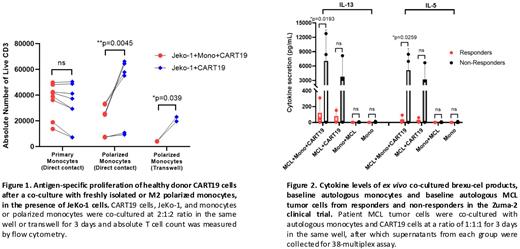Abstract
CD19 directed chimeric antigen receptor T (CART19) cell therapy has resulted in remarkable outcomes in B cell malignancies and was FDA approved in multiple indications. However, durable remissions are limited to 40% of treated patients. A predominant mechanism for CART19 cell failure is their inhibition by the immunosuppressive tumor microenvironment, including inhibitory myeloid cells. Monocytes have been demonstrated to suppress T cell expansion during CART cell production, as well as to contribute to the development of CART cell toxicities and resistance. In this study, we aimed to study the interactions between monocytes, CART19 cells, and tumor cells to determine how monocytes-CART19 cell interactions impact CART19 cell effector functions and clinical outcomes. We employed two independent but complementary experimental approaches, 1) co-cultures of CART19 generated from healthy blood donors, CD19+ tumor cell lines and healthy donor monocytes; and 2) utilized brexu-cel products from Zuma-2 clinical trial that led to the FDA approval of brexu-cel in mantle cell lymphoma (MCL) and selected six patients with circulating disease, three responders and three non-responders.
For the in vitro experiments, we used a CD28 costimulated CART19 (CART19-28ζ) cells generated in the lab from healthy donors and tested their interactions with Jeko-1 (a CD19+ MCL cell line) and monocytes. Freshly isolated monocytes did not inhibit CART19 antigen specific proliferation following a co-culture with Jeko-1 in the same well. However, donor monocytes polarized by GM-CSF and Jeko-1 cell line in vitro obtained immunosuppressive M2 phenotype and resulted in significantly suppressed CART19 cell antigen-specific proliferation at the end of the same-well co-culture. Notably, transwell experiments demonstrated that such M2-mediated CART19 cell inhibition does not require direct physical contact and is at least partially dependent on soluble factors (Figure 1). To unravel the mechanisms leading to this interaction, we interrogated the cytokine secretion following a 3-day co-culture of CART19 cells with Jeko-1 cells and either primary monocytes or polarized M2-like monocytes which were generated through a 7-day co-culture with GM-CSF followed by a 24-hour co-culture with Jeko-1. In the presence of CART19 and tumor cells, monocytes were activated to produce significant level of T-cell chemoattractants, including eotaxin (p=0.03), GRO (p=0.0004), MCP-3 (p<0.0001), MCP-1 (p=0.0272) and IL-8 (p=0.0379), compared to co-cultures of CART19 and tumor cells.
Then we employed an ex vivo co-culture model with the Zuma-2 samples (brexu-cel products, autologous monocytes, and autologous MCL tumor cells prior to CART19 cell infusion. We found significantly elevated cytokines in non-responders, upon CART19 (brexu-cel) interaction with autologous, patient-matched monocytes and tumor cells. These include IL-13 (p=0.0193) and IL-5 (p=0.0259), Figure 2. IL-13 is known for its inhibitory effects on T cells; IL-5 is known to promote growth and differentiation of B cells and eosinophils. These cytokines did not show or showed limited differences between responders and non-responders when CART19 were stimulated with tumor cells in the absence of monocytes, when CART19 were cultured with monocytes only, or when monocytes were cultured with tumor cells. This presented that the three-way cross-interaction between monocytes, CART19 cells and tumor cells is required for the strong immune-suppressive environment generated in non-responders. Importantly, there was no difference in effector, proliferative and homeostatic T cell cytokines, including IFNy, TNFa, TNFb, IL-2, IL-4, IL-7 and IL-15, between responders and non-responders in the presence or absence of monocytes.
Our results highlighted specific inhibitory effects on CART cell functions, mediated by the cross-talk between CART19 cells, mantle cell lymphoma cells and monocytes. These findings warrant further investigation as they could potentially have implications for new treatment strategies to maximize CART therapeutic efficacy and improve durable responses by interfering the suppressive impacts from monocytes to CART19.
Disclosures
Sakemura:Humanigen: Patents & Royalties. Cox:Humanigen: Patents & Royalties. Mattie:Gilead Sciences Inc.: Current Employment. Nguyen-Mau:Kite, a Gilead company: Current Employment. Filosto:Kite, a Gilead Company: Current Employment, Current equity holder in publicly-traded company; Tusk Therapeutics: Patents & Royalties. Kenderian:Life Engine: Current holder of stock options in a privately-held company; Morphosys: Research Funding; LEAH Labs: Current holder of stock options in a privately-held company, Research Funding; Viracta/Sunesis: Research Funding; Tolero: Research Funding; Lentigen: Research Funding; Humanigen: Consultancy, Membership on an entity's Board of Directors or advisory committees, Patents & Royalties: CART cell therapy , Research Funding, Speakers Bureau; MustangBio: Patents & Royalties; Mettaforge: Patents & Royalties; Juno/BMS: Consultancy, Research Funding, Speakers Bureau; Kite/Gilead: Consultancy, Research Funding, Speakers Bureau; Novartis: Consultancy, Patents & Royalties: CART cell therapy , Research Funding, Speakers Bureau.
Author notes
Asterisk with author names denotes non-ASH members.


